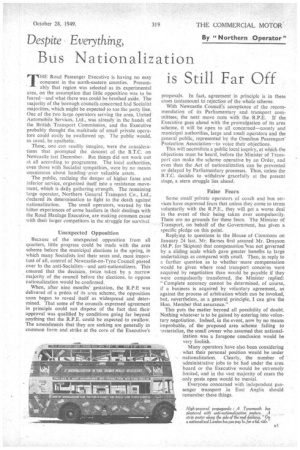Despite Everything,
Page 37

If you've noticed an error in this article please click here to report it so we can fix it.
Bus Nationalization is Still Far Off
'HE Road Passencer Executive is having no easy conquest in the north-eastern counties. Presum _ ably that region was selectedas its experimental area, on the assumption that little opposition was to be feared and what there was could be brushed aside. The majority of the borough councils concerned had Socialist majorities, which might be expected to toe the party line. One of the two large operators serving the area, United Automobile Services, Ltd., was already in the hands of the British Transport Commission, and the Executive probably thought the_ multitude of small private operators could easily be swallowed up. The public would, as usual, be apathetic.
These, one .can readily imagine, were the considerations that prompted the descent of the B.T.C. on Newcastle last December. But things did not work out at all according to programme. The local authorities, even those with Socialist sympathies, were by no means unanimous about handing .overvaluable assets.
The public, realizing the danger of higher fares and inferior service, organized itself into a resistance movement, which is daily gathering strength. The remaining large operator, Northern General Transport Co., Ltd., declared its determination to fight to the death against nationalization. The small operators, warned by the bitter experiences of some hauliers in their dealings with the Road Haulage Executive, are making common cause with their larger competitors in the struggle for survival.
Unexpected Opposition Because of the unexpected opposition from all quarters, little progress could be made with the area scheme before the municipal elections in the spring, in which many Socialists lost their seats and, most important of all, control of Newcastle-on-Tyne Council passed over to the anti-Socialists—and anti-nationalizers. This ensured that the decision, twice taken by a narrow majority of the council before the elections, to oppose nationalization would be confirmed.
When, after nine months' gestation, the R.P.E was delivered of a précis of its area scheme, the opposition soon began to reveal itself as widespread and determined. That some of the councils expressed agreement in principle could not dispose of the fact that their approval was qualified by conditions going far beyond anything that the R.P.E. could be expected to swallow. The amendments that they are seeking are generally in common form and strike at the core of the Executive's proposals. In fact, agreement in principle is in these cases tantamount to rejection of the whole scheme.
With Newcastle Council's acceptance of the recommendation of its Parliamentary and transport committees, the next move rests with the R.P.E. If the Executive goes ahead with the promulgation of its area scheme, it will be .open to all concerned—county and municipal authorities, large and small operators and the general public, represented by the Omnibus Passengers' Protection Association—to voice their objections.
This will necessitate a public local inquiry, at which the objections must be heard, before the Minister of Transport can make the scheme operative by an Order, and even then the Act of nationalization can be prevented or delayed by Parliamentary processes. Thus, unless the B.T.C. decides to withdraw gracefully at the present stage, a stern struggle lies ahead.
False Fears
Some small' private operators of coach and bus services have expressed fears that unless they come to terms voluntarily with the R.P.E., they will get a worse deal in the event of their being taken over compulsorily. There are no grounds for these fears. The Minister of ,Transport, on behalf of the Government, has given a specific pledge on this point.
Replying to questions in the House of Commons on January 24 last, Mr. Barnes first assured Mr. Drayson (M.P. for Skipton) that compensation was not governed by a sliding scale which gave greater benefits to large undertakings as compared with small. Then, in reply to a further question as to whether more compensation would be given where road transport concerns were acquired by negotiation than would be payable if they were compulsorily transferred, the Minister replied: "Complete accuracy cannot be determined, of course, if a business is acquired by voluntary agreement, as against the process of arbitration which can be invoked, but, nevertheless, as a general principle, I can give the Hon. Member that assurance."
This puts the matter beyond all possibility of doubt_ Nothing whatever is to be gained by entering into voluntary negotiation. Indeed, in the event, now by no means improbable, of the proposed area scheme failing to materialize, the small owner who assumed that nationalization was a foregone conclusion would be very foolish.
• Many operators have also been considering what their personal position would be under nationalization. Clearly, the number of administrative jobs to be had under the area board or the Executive would be extremely limited, and in the vast majority of cases the only posts open would be menial.
Everyone concerned with independent passenger transport in East Anglia should remember these things.




























































































